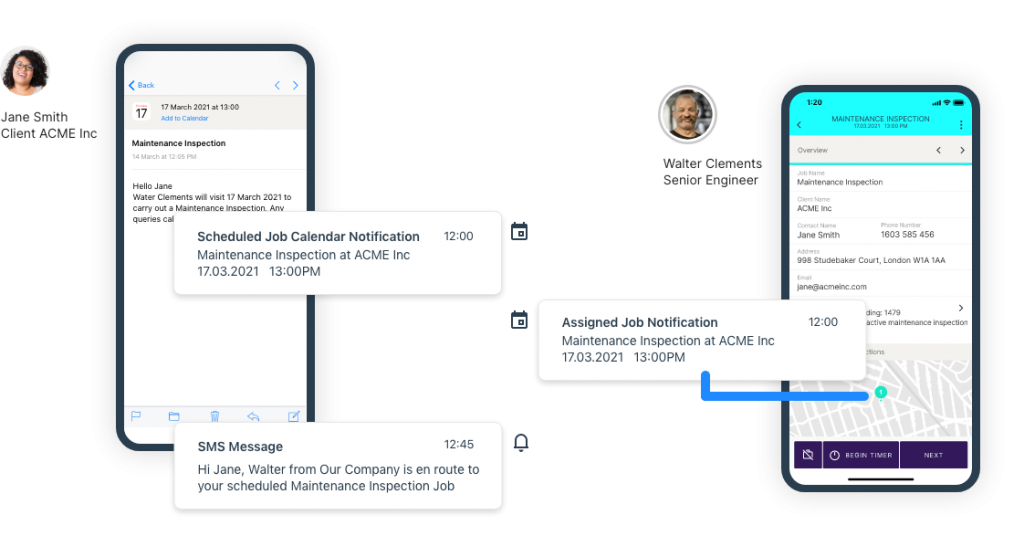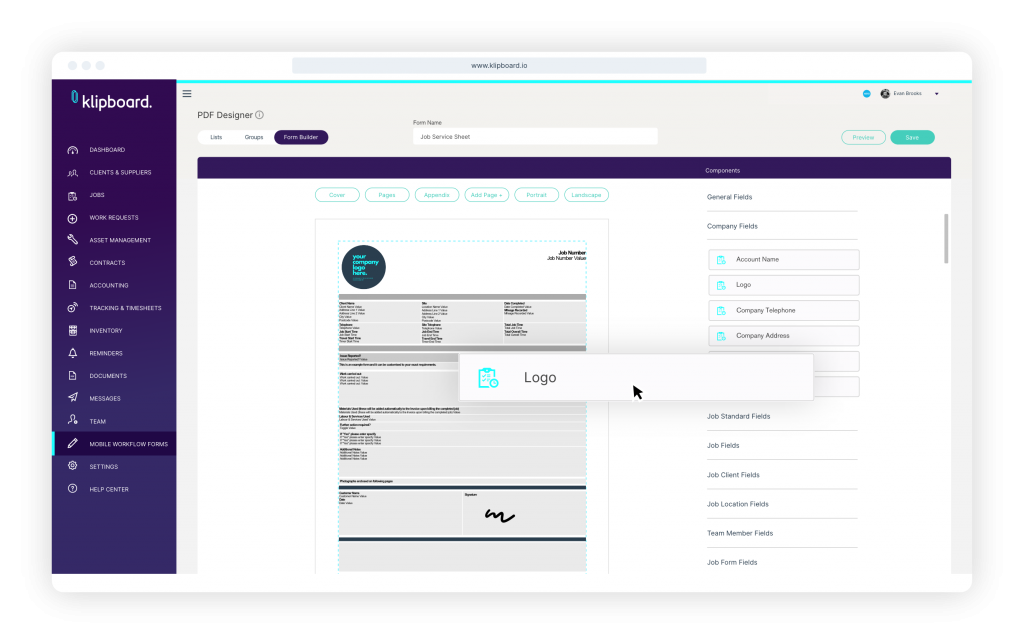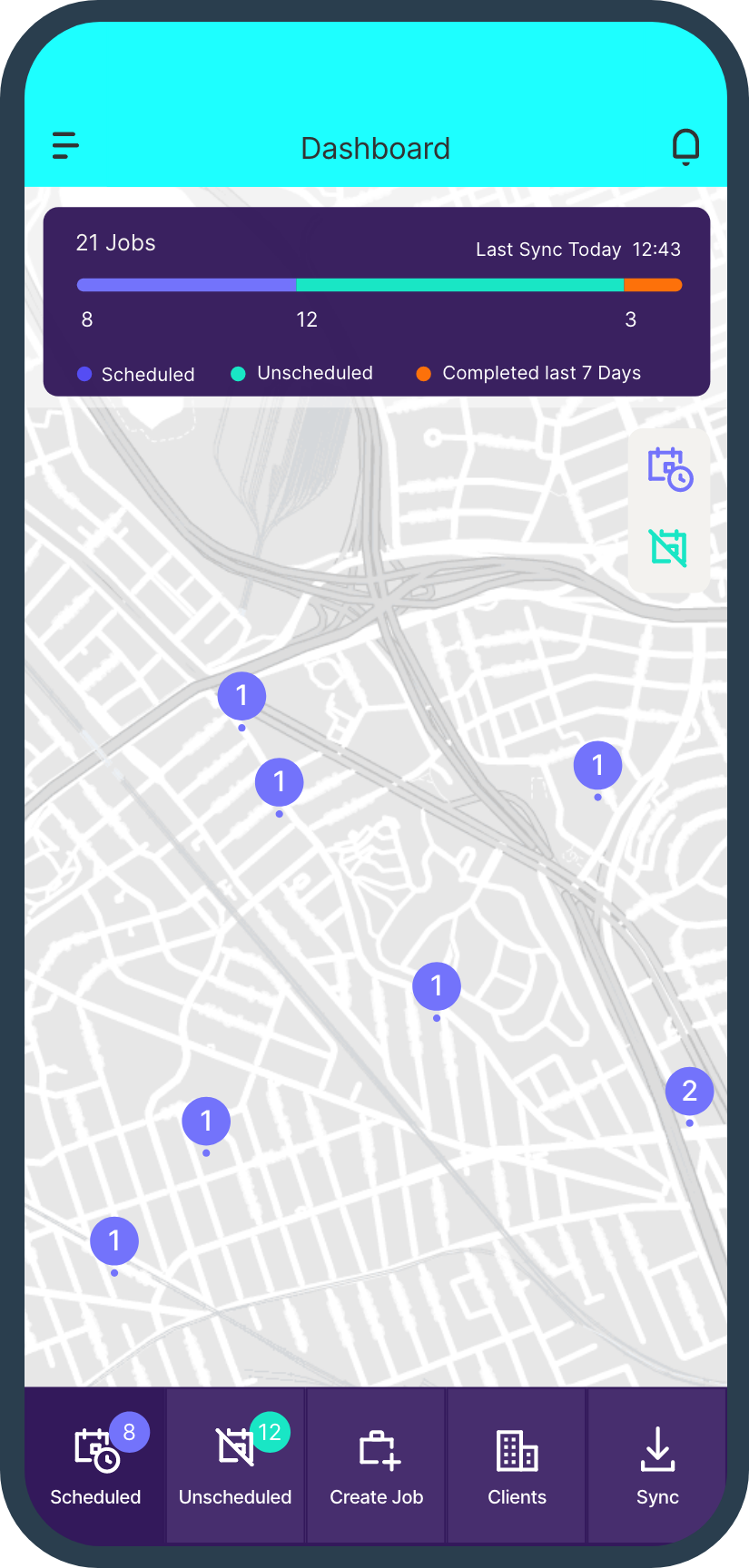No shows are costing your Field Service business revenue and it’s holding back the growth of your company.
The fast paced and competitive nature of the Field Service industry is putting pressure on business owners to maximise the use of their team and meet their clients ever growing demands.
It’s believed that around 20 to 30 percent in revenue is lost every year due to operational inefficiencies, such as poor job scheduling and resource allocation.
Job Scheduling is a challenging part of field service management. It’s also the area that has seen the most investment in the last few years. Software has played a huge part in increasing the efficiency of how Field Service businesses operate.
Without proper management of your team’s schedule, a last minute cancellation, missed appointment or an error in the booking process will cause your customers to be negatively affected, your team’s morale will drop and growth in your business will stall.

Why do no-shows occur in Field Service?
There are many reasons a customer or your own workforce will miss or cancel an appointment. The reasons are as varied as the number of industries in Field Service, here are some of the more common reasons common across most markets:
Miscommunication
This is heart of the matter for no-shows. Often simple misunderstandings can be avoided if both parties; the client and the Field Service provider, have the tools to make sure everyone has a clear picture of what’s expected to happen.
- When will the engineer arrive?
- Who is coming?
- What’s the location?
- Who are they meeting?
- What’s the nature of the job?
- What are the specific details of the equipment they are servicing?
- Who serviced the asset last?
You can reduce no-shows by knowing the answers to these questions and communicating them to your clients and your field service team.
Poor team reliability
It’s not always the client at fault for a no-show. It’s often likely that the issues will arise from within your own team. Poor reliability within your own workforce is an avoidable issue and not one likely to be forgiven by your client.
Poor time keeping or attendance issues occur in disengaged team members. It’s your responsibility as a business owner to ensure you correctly motivate your team and keep them aligned to your goal of delivering a service to your customers.
Have you properly trained your team?
When your team hasn’t had the correct training to service certain machinery or equipment they might not wish to work on certain jobs, this might not be known to your scheduling team so ensure you’re allocating the right person to the right job.
Burnout is a big issue in the Field Service industry. Work-related stress costs the UK around 18 million days a year. Spotting burnout is key to avoiding it but having a better job scheduling system in place will ease the burden on your team and create a better work/life balance for them.
Jobs overrunning
When the scope of a project is underestimated then it’s difficult to allocate more resources to other customers while your team is still tied up on another customer job.
Operational visibility is key to effective job scheduling.
Without a top down view of your team’s capacity it’s almost impossible to plan for jobs that over run. It’s not enough to simply allocate an engineer and give them a work sheet and an address. You need to assess the length of time that job will take and the potential effect it could have on other customers should it over run.
Poor integration of your software
Problem occur when the systems you have in your business don’t ‘talk’ to each other. This is very common in long established businesses where they have acquired new software and tech on their journey but little of it integrates with each other.
Without a standardised system, your team will be expected to shift from one system to the next. Having your client information in one place and your scheduling system in another is an immediate red flag. Having an All-in-one software system will improve how well information is shared around your business and reduce mistakes that lead to no-shows.
Double bookings
The opposite of no engineer turning up for a Field Service job is when you double book and two of them arrive!
This creates confusion with between your teams, distrust in your booking system and reduces team morale. It also creates a poor experience for the customer, they might not mind too much as they could just be satisfied that someone is there to work on the job but it creates an unprofessional experience.
Double bookings will mean another job doesn’t get finished and that costs you revenue and creates a poor experience for another customer.
How to reduce no-shows
Reducing no-shows is key for enabling growth in your Field Service business. For such an important and complex issue in the industry there is a delightfully simple answer – improve communication.
Supercharge your scheduling to reduce no-shows
If you are still operating your business with phone calls, emails and paperwork then it’s no surprise that no-shows and human error will occur.
The food and parcel delivery industry has revolutionised realtime communication and service delivery. The likes of Uber, UPS and Deliveroo have changed the landscape of customer expectations.

The modern customer expects to be able to clearly see when their parcel, food or taxi is arriving. They will know when it will arrive, who’s delivering it and in some cases how far away they are.
The problems a lot of Field Service businesses are facing is that they are trying to live up to these expectations while still managing a lot of the communication manually. This leads to crossed wires, human error and miscommunication. Sometimes appointments are missed completely so your engineer travels needlessly to a job that won’t happen and that meant not being able to service a customer who needs them – that’s costing you revenue.
For more on how to deliver an ‘Uber-like’ experience for your customer click here.
How to handle no-shows
They are going to happen. You can mitigate the effects of them with the smart use of technology and the proper training, but it’s the nature of your industry that no-shows will occur.
How you handle them is in your control.
Firstly, acknowledge the know show, regardless of who’s at fault. A simple email or SMS to the client and the engineer to confirm the job didn’t take place but you intend on rescheduling it is the minimum expected by your client and your team.
If you operate in a highly regulated industry, highlight the importance of meeting compliance to all parties. A missed service shouldn’t be taken lightly if it could potentially put your client’s business at risk. There’s no need to deliver this in an aggressive manner but a simple acknowledgement that your business is dedicated to helping the client meet compliance is all that’s required.
After that you have an opportunity to update your scheduling system so you can be flexible enough to react with speed and respond to new call outs or new jobs added to your stack of work.
Those Field Service businesses who use Field Service Management software will be able to quickly adjust their plan and update the availability of engineers to the whole business in real time.
If communication is the problem. Field Service Management Software is the answer.
No-shows can be avoided when you eliminate human error, when you improve workforce reliability and streamline your processes.
Field Service Management software will do that for your business. To reduce no-shows you’ll need to take advantage of a few features found in Klipboard, specifically designed to help you complete more jobs, avoid no-shows, reduce admin, limit mistakes and grow revenue.
Automated Customer Communication
Remind your customers they have a job booked or that you’re on the way with Klipboard SMS text and email alerts.
Significantly improve communication with your customers by using our Automated Customer Communication tools. This feature allows you to create bespoke messages for each client and it’s simple to use.

Many Field Service businesses use this feature to say thank you for a job completed and request feedback. This can be a great way to gather reviews and grow your business.
Setting up these notifications is simple to do on Klipboard.
All you have to do is define the number of weeks you want to set before the reminder is automatically sent via your job management software. This can be set per customer asset, in fact each asset can have more than one schedule of communication if required.
That means your client can be automatically notified their asset requires a service, promoting them to book the work in with you. That’s future work scheduled, completely hands free!
Use Client Portals for complete visibility
Client Portals are a game changer for Field Service businesses. These allow you to give your clients a real-time overview of their jobs and highlight any unapproved quotes or unpaid invoices.
You can streamline your communication with your client and reduce the number of emails and phones calls you get from your client, leaving you to complete more jobs.
You’re a lot less likely to get no-shows when your client can quickly and easier hop onto their Client Portal and see all scheduled work.
This is a fully branded space where you can highlight new services you’re offering and impress your clients every time they login.
Improve customer engagement
You might be getting frequent no-shows because your client isn’t engaged or understands the importance of the service you provide.
Klipboard allows you to create PDF reports so you can summarise the work carried out and deliver that to designated email addresses automatically.
If you work in a highly regulated industry, highlight not just the work you do but how that helps the client meet their compliance standards.
These professional looking reports are easy to make on Klipboard. We’ve developed a fantastic drag and drop form builder allowing you to build exactly what you need with ease.
Once the Field Service job is completed in the field the data they collect can be synced back to the office, this data populates your PDF outputs. No programming knowledge is required and it can be trained in a matter of minutes, you can put together engagement reports for your clients helping you reduce no-shows.

Upgrading your software will level up your team
To keep your team motivated you need to give them the right tools for the job.
A motivated team will complete more jobs, make fewer mistakes and reduce no-shows. Having a robust and easy to use Field Service Management software system like Klipboard will empower them to get more done. It will show them you’re making an investment in their work and will ease their personal burden of managing emails and text messages to manage their workload.
Having Klipboard means they can forget about the admin and focus on what’s really going to add value to your business – completing more jobs.

